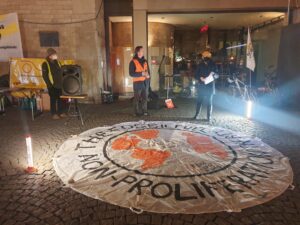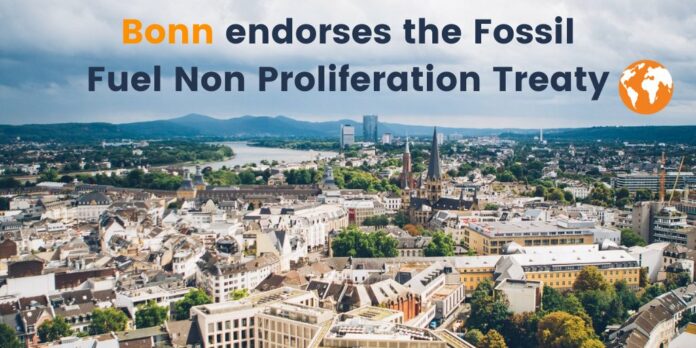On the eve of the Paris Agreement’s anniversary, the United Nations city of Bonn calls for international cooperation to phase-out oil, gas and coal and respect the 1.5 objective
Bonn’s city council has endorsed the Fossil Fuel Non-Proliferation Treaty, a global initiative that aims to address the source of 80% of the CO2 emissions that cause climate change: fossil fuels. The vote received support from Green, Social Democrat, Left Party and Volt councilors at the last meeting of the environment committee on November 25. The motion passed as Germany’s new coalition government agreed on a 2030 coal exit and diplomatic pressure mounts around the near-complete and controversial Nord Stream 2 gas pipeline, a project that would emit the equivalent of 5% of all 2019 EU CO2 emissions if carried out.
Mayor of Bonn, Katja Dörner, welcomes the city’s participation: “The goals of the global initiative coincide with the City of Bonn’s commitment to the Paris 1.5-degree target laid down in our climate emergency resolution and with our goal of being climate neutral by 2035. One thing is clear: the only way to achieve climate neutrality is through renewable energies and a gradual decarbonization of our energy supply. The City of Bonn has expressed this with its mission statement resolution on climate protection and climate adaptation and has set itself the goal of successively converting its energy supply to renewable energies by 2035.“

Since Bonn itself was host to the UN climate talks 20 years ago and the 2017 COP23 conference presided over by Fiji, the international conversation has shifted with clear scientific consensus that fossil fuels are the biggest driver of the climate crisis and fossil fuels finally getting a mention in the closing text of the latest negotiations. Yet, the world’s governments are still expected to produce more than twice the amount of fossil fuels in 2030 than would be consistent with limiting warming to 1.5°C.
Bonn’s vote sends a strong message to the international community about the importance of shifting from just mentioning fossil fuels towards earnest action to address the climate crisis. They join dozens of cities – including Los Angeles, Barcelona, Sydney and Dhulikhel in Nepal – who are also demanding this Treaty as a framework for international cooperation to phase out oil, gas, and coal production and ensure that our goal of 1.5°C stays alive. In contrast to the lack of concrete climate commitments by many Northern countries at COP 26 in Glasgow, the city of Bonn is taking real action to meet the climate challenge.

The motion was submitted by Bonn citizen and EU climate pact ambassador Sven Harmeling and supported by six local organizations and groups: Extinction Rebellion, Fridays For Future, Germanwatch, Moratorium-A565, Parents for Future and Psychologists, Psychotherapists for Future. It stipulates that the city of Bonn joins the Fossil Fuel Non Proliferation initiative and its efforts to phase-out of fossil fuels and ensure a fair transition to a sustainable and climate-friendly energy system based on renewable energies.
Sven Harmeling, Bonn citizen and volunteer EU Climate Pact Ambassador, who submitted the motion, said: “As the capital of the international climate diplomacy and host city of the UNFCCC secretariat, it is important for Bonn’s credibility to act as a consistent champion for the 1.5° C target of the Paris Agreement and to take the necessary steps for its implementation. Bonn’s endorsement of the initiative for a Fossil Fuel Non-Proliferation Treaty as the first city in Germany is a logical addition to the city’s previous climate protection resolutions, policies and measures and must now be translated into subsequent concrete measures.”
The initiative for a Fossil Fuel Non-Proliferation Treaty, inspired by the nuclear non-proliferation treaty and supported by more than 1,000 civil society organizations, gained further momentum at the COP26 climate conference in Glasgow. The growing circle of supporters includes 101 Nobel Laureates, 2,600 academics, 150 Parliamentarians, youth leaders and international faith leaders.
Seble Samuel, Cities Lead for the Fossil Fuel Non-Proliferation Treaty Initiative : “Cities around the world are building collective momentum for a fossil fuel free world, and putting pressure on national governments to keep all fossil fuels in the ground. As the headquarters of the UN Climate Secretariat, Bonn’s move to call for an end to the fossil fuel era should reverberate across all signatories of the Paris Agreement, signalling that true climate leadership is fossil free.”
The COP 26 outcome was insufficient, Samuel says, but the issue of fossil fuels is now on the table of climate negotiations. It will be impossible for both local and national governments to avoid tackling their production if they want to show real climate leadership.
Christoph Bals, Executive Director of Policy at Germanwatch: “The decade of implementation of earnest climate protection has begun, in Germany, the EU and internationally. Bonn’s endorsement of the fossil fuel treaty initiative is an important signal for this. This must now be put quickly into practice through concrete steps together with other cities and for our own energy supply.”
Tasneem Essop, Executive Director of the Bonn-registered Climate Action Network International (CAN International): “A Fossil Fuel Non-Proliferation Treaty offers a vision and path for what true international climate leadership and cooperation could look like. Climate action starts with local communities and cities making a commitment to abandon fossil fuel and leading the way for a just and equitable transition to clean energy. As home to the UN Climate Change Secretariat and the host city for numerous climate change meetings over the years, the City of Bonn can be a perfect example of such leadership. Having committed to the goal of being carbon neutral by 2035, the City of Bonn joining the Fossil Fuel Non-Proliferation Treaty is an important signal to realise this promise and an inspiration to other cities to lead on efforts for a safe and healthy future.”
Prof. Dr. Niko Froitzheim (University of Bonn), Extinction Rebellion Bonn: “Global warming has reached 1,2 °C above pre-industrial levels. This moderate number already, means catastrophic damage not only for the global South but also for Middle Europe, with a three-year drought and a devastating flood catastrophy. 1,5°C will be much worse, and beyond 1,5 °C we risk to pass tipping pointsturning life on Earth into a nightmare. We can no longer claim that we didnot know. We know that going on with the burning of fossil fuels is a crimeagainst humanity and nature and it must be treated as such.”
About the Fossil Fuel Non-Proliferation Treaty Initiative
The Fossil Fuel Non-Proliferation Treaty Initiative is spurring international cooperation to end new development of fossil fuels, phase out existing production within the agreed climate limit of 1.5°C, and develop plans to support workers, communities and countries dependent on fossil fuels to create secure and healthy livelihoods.
The proposed Treaty draws on lessons from global efforts to stop the spread of nuclear weapons and ban ozone-depleting chemicals, landmines and other threats to humanity. It will advance action under three pillars:
- Non-Proliferation: Don’t Add to the Problem. An immediate end to the expansion into new reserves of coal, oil and natural gas would limit the globe’s production of carbon emissions (which if left alone would create more than twice over the limit set by the United Nations and other organizations).
- Fair Phase-Out: Get Rid of the Existing Threat. Since already operating oil and gas fields and coal mines contain more carbon than can be burnt under a 1.5°C target, phasing out those current stockpiles is a much-needed step to keep the world under the Paris Agreement’s temperature limits.
- Just Transition: Accelerate an Equitable Transition. Every worker, community, and country must be taken into the deepest consideration on the way to fast-tracking all solutions. Only a proactive plan to enable economic diversification, implement renewable energy and other reliable, cost-effective low-carbon solutions will be able to meet the needs of a sustainable future.




